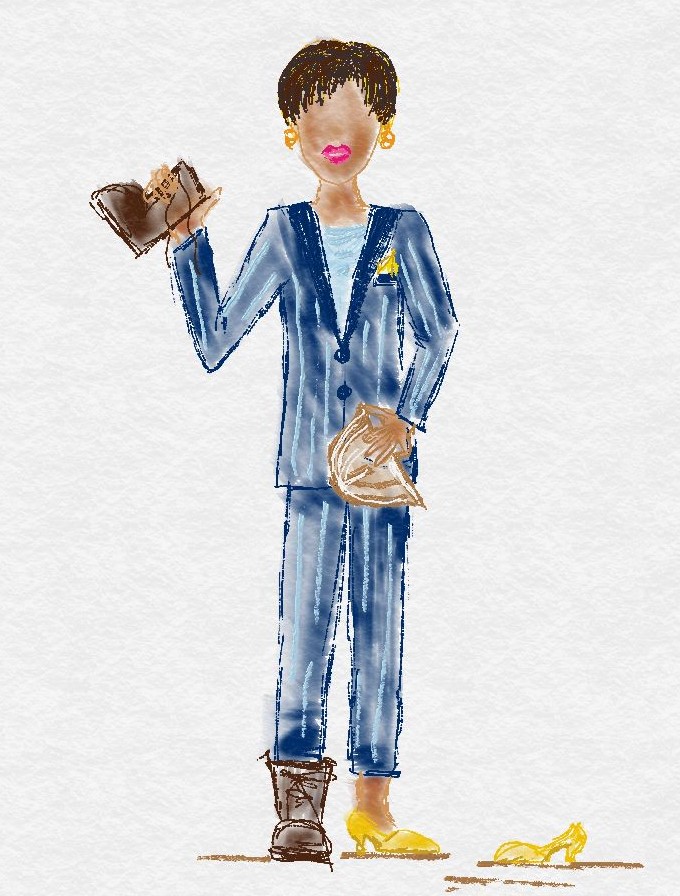Confidence
I Can Do That
My Favorite Things

Early summer brings many of my favorite things. I get to visit the local nursery and spend way too much money on every annual flower that catches my eye. Lunches, dinners, cocktails, brunches, and even afternoon coffee take place outside on patios, piazzas, decks, and sidewalks. And sundresses and espadrilles are parts of a daily uniform.
But one of my absolute favorite early summer occurrences is the annual emergence of young, eager new male construction workers on all my jobsites. Wait – did I just say male workers? Is this going to be the start of a new, lecherous, politically incorrect phase in the life of Underpinnings? As interesting as that sounds (and lucrative), alas, the truth is much simpler and more wholesome.
Every year, young men everywhere graduate from high school and follow their fathers and uncles and grandfathers and mothers along a natural path into a wide variety of construction trades. These guys usually, if not always, are amazing examples of self-confidence and enthusiasm. They volunteer for every task. They say, “I can do that” with unabashed ease. They take pride in outlifting and outdigging and outworking everyone around them. And they eat everything in sight, constantly talking about and thinking about food.
(There might be some girls who enter the construction field when they graduate from high school, but I haven’t run into them on my jobsites. And I would bet that those few that are out there, somewhere, don’t have the ten-feet-tall-and-bulletproof attitude of their male counterparts).
Of course they have their obstacles. The older guys hide their tools. The jaded, experienced workers scoff at their swagger and interject a thousand cynical retorts for every ambitious proclamation. And the young guys’ inexperience and hubris often trips them up as they try to climb to the top in 20 seconds.
Regardless of their faults, I love these guys. I am in awe of their complete lack of angst. They don’t worry about letting anyone down. They don’t agonize about whether or not they can handle their jobs. They don’t overanalyze every co-worker’s words to determine if anyone is secretly disappointed in their performances or upset with them. And I think it goes without saying that any sane person would envy the ability to down three sausage egg biscuits and be hungry 30 minutes later.
Conversely, I have noticed that most women, when entering a new position or moving up into a new role, proceed at a much more cautious pace. We worry that we’re not smart enough or efficient enough or resourceful enough to do our jobs. The normally low buzz of panic and self-doubt that is the background music in our brains swells to a roar of incessant trepidation. Instead of being thrilled to have a new opportunity, we’re scared. We don’t need obstacles to crop up; we imagine them and spend all of our time dodging their looming specters in our brains.
The role of biology might have a partial role in this gender difference, particularly for women who are in male-dominated fields. We have the responsibility to nurture and protect our offspring, so we have to be a little less damn-the-torpedoes in our approach to life. We also have to be careful in a world where we’re typically smaller and weaker than the opposite sex.
My older brother would say that this natural caution is not natural at all, because he believes that there is no nature in the nature versus nurture debate, only nurture. His theory is that men and women would behave exactly the same if they were treated identically from birth. I don’t agree with him, but many people do. I believe that biology is part of the equation, but social development contributes as well. And maybe that’s where we can advance. A little bit of evolution in how we raise our daughters could produce a little less angst and a little more “I can do that!” We can do so many great things when we think about our jobs in terms of opportunity rather than potential failure.
My best friend (we’ll call her Environmental Girl, or EG for short) is a great example of how far a woman can go when she doesn’t hold herself back. A number of years ago, her company successfully bid on an environmental remediation project at an abandoned army airfield on an island in the middle of the Pacific Ocean populated only by endangered birds. (The blue footed booby frequently holds raves on the airstrip). The project would last several months, and the crew would travel to the island and stay there for the duration. No TV or radio, and hot coffee only when there was enough generator time available. EG said, “I want to go!”
This might seem bold, but it was particularly fearless given that her youngest daughter would be only 5 months old when the project would start. What??????
Many, many people said she was crazy. Her mother told her she was going straight to hell and she would need any profit from the job to pay for her infant daughter’s inevitable astronomical therapy costs when she got older. Female colleagues expressed shock and ran home to embrace their kids. But besides the fact that EG’s husband was a completely capable caregiver, as were her other 142 kids who all lived at home, the project only spanned a short time period. And it was a fabulous, once-in-a-lifetime opportunity! So she said yes, and she went. Damn more than the torpedoes – damn the whole fleet.
The experience was phenomenal, and EG learned things about herself she never would have otherwise. I am pleased to report that the endangered infant has grown into a daring chip off the adventurous old block, and she might be inclined to take on a project in the middle of the Pacific or take a position as chief of staff for the president of an international company and never doubt herself. When we doubt ourselves and hesitate to take chances and always put ourselves last, we teach our daughters to do the same. When we go after what we want and trust ourselves to be enough, we increase the chances that they will succeed.
Not every situation warrants a fearless attitude. Caution has its place. But self-confidence shouldn’t be an unknown quantity to women in the work world. We shouldn’t spend our time worrying about what we might do wrong, we should envision how high we can fly. Repeat after me – I can do that!
What Price Ambition?
Hey – Your Ambition is Showing
By Ann Schmelzer, Guest Contributor

(Editor’s Note: Ann is a top-level manager for a major international manufacturer. Someday we will all be working for her, and that’s not a bad thing. Although she is not in the deep foundations industry, she spends all day every day with men, most of them engineers. It’s no wonder her right brain takes over on the weekends, doing things like starting one of the most successful food and beverage festivals in the Midwest and coaching raging hormones girls’ soccer).
The other day I sent Peggy a screen capture of an article I was reading that made me think of her. What I subsequently learned is: Be careful what you text your friends who have a blog that is topically relevant… I’m kidding.
The article I sent was Reese Witherspoon’s recent essay in Glamour on ambition (Glamour October 2017). The screen capture itself highlighted a study that single female Harvard MBA students downplayed their career ambitions in front of male classmates for fear of possibly hurting their marriage prospects. I’m not trying to share business that isn’t mine (we’ll get to my business later), but Peggy had a dating experience in which her full life and busy schedule were questioned by an unnamed gentleman in the following way— “But don’t you want to be happy?” Dear God… what year is it? Hence, why I sent Peggy the screen capture, and hopefully a much-justified chuckle.
Reese writes an eloquent essay on the topic of ambition. The fact that she had to is somewhat saddening to me; but, at least we’re talking about it. At one point she states “Run away from a man who can’t handle your ambition. Run. So many men think ambition is awesome and sexy!” I agree Reese, but a lot of men don’t wear “I find drive emasculating” on a T-shirt to the first date. You learn that the person in question says one thing and actually wants another over time—sometimes a little time, sometimes a lot of time.
In my case, I learned it slowly– death-by-a-thousand-papercuts-style over the course of four years. In my early twenties I dated a guy who, at the time, I was very much taken with and it seemed that the feeling was mutual. He talked a great game; I mean a great game. When we talked about my career ambitions there wasn’t a whiff of hesitation in his voice. He seemed to be genuinely into my ambition.
Things eventually crashed and burned during a period of time when his career was floundering. I, by contrast, was in the middle of two masters’ degrees and a career that wasn’t floundering. I’ll spare you, dear readers of Underpinnings, all the gory details but, in hindsight, the thing that made me the angriest was that I found out he had been cheating on me with the Sunday school teacher from his family’s church. The. Sunday. School. Teacher. The cheating alone was a bitter enough pill to swallow, but the chosen partner was really the icing on the cake. Don’t get me wrong, I’m guessing she didn’t know I existed. (If she did, the irony there is on an almost incomprehensible level). Upon Monday morning quarterbacking the whole situation, it is my assumption that his need for that relationship was to shield his ego from the uncomfortable mirror I held up to his own lack of progress. Perhaps that’s me shielding my own ego from the fact that my relationship crumbled because I couldn’t pull off the perfect balancing act of non-threatening and go-getter.
The thing is that I had never hid who I was and, in the beginning, it was the greatest thing ever. By the end, the look on his face all but said “wow, you’re really like this all the time”… and not in a good way. Did he think I was lying in the early days? If I had been, wouldn’t that have been worse for everyone? These are questions not worth pondering.
So, I was the MBA-educated girl who did not tamp down her ambition. If I had, perhaps I could have nursed that relationship along for a bit but, in the end, I’m sure it would have come to a similar demise. Regardless, there are lots of different ways to interpret the Harvard study. Maybe the women being interviewed thought “What’s the harm in softening the wording here? I can still go get it done; that’s my business”; or, “These questions rarely go well for me so here is my canned response”; or, “Remember when you beat that boy in the math bowl in middle school and got uninvited to the dance on Friday?”. There are a lot of possibilities but, in the end, what a difficult commentary on the state of gender equality.
Judith Warner, who is a senior fellow at The Center for American Progress writes “Although women have outnumbered men on college campuses since 1988, they have earned at least a third of law degrees since 1980, were fully a third of medical school students by 1990, and, since 2002, have outnumbered men in earning undergraduate business degrees since 2002. They have not moved up to positions of prominence and power in America at anywhere near the rate that should have followed. In a broad range of fields, their presence in top leadership positions—as equity law partners, medical school deans, and corporate executive officers—remains stuck at a mere 10 percent to 20 percent. Their “share of voice”—the average proportion of their representation on op-ed pages and corporate boards, as TV pundits, and in Congress—is just 15 percent. In fact, it’s now estimated that, at the current rate of change, it will take until 2085 for women to reach parity with men in leadership roles in our country.” With statistics like that, who can blame the women of Harvard?
Later in the article Reese comes back to “All we can do to create change is work hard. That’s my advice: Just do what you do well. If you’re a producer, you’ve got to produce. If you’re a writer, you’ve got to write. If you’re in corporate America, keep working hard to bust through the glass ceiling. If you want our voices to be represented in government—and I think we’re all getting behind that idea now—encourage women to run and help them with their campaigns. If you are one of those people who has that little voice in the back of her mind saying, “Maybe I could do [fill in the blank],” don’t tell it to be quiet. Give it a little room to grow, and try to find an environment it can grow in.” I couldn’t say it better myself.
What Time Are You Leaving?
How to Avoid Killing Your Colleagues

It’s Thursday afternoon at 3:50 PM. You’ve managed to end a phone call with a very talkative client who just happens to spend $3 trillion dollars with your firm every year. If you can make it out the door in the next 15 minutes, you’ll blow through the parkway before traffic gets bad, swing by the sitter to pick up the little kids, make it to the dry cleaner before they close, and have dinner on the table by 6:30, assuming the older kids didn’t eat the dinner ingredients when they got home from high school this afternoon. (Seriously – I can’t even count how many times I said over the years “You know where Kroger is. I suggest you get there and back VERY fast and replace what you just ate so the rest of us can have dinner. Who cooks ground beef as an after school snack?!”) If anyone delays you by even 10 minutes, you’ll sit in traffic for an eternity, have to pay a late fee at the sitter, the dry cleaners will be closed so you’ll have to wear your suit with the Gogurt stain on it for your big presentation tomorrow, and no one will eat dinner. Maybe ever. Are you getting tense just reading this? Did you check your watch? Drink some wine.
Back in our horror film scenario, just as you start to slip out your door, a familiar refrain can be heard from the next office door. “Leaving already? Wow. I never knew this was a bank.” Yes, it’s Carl. Carl is the engineer in the next office who has made it his life’s ambition to provide the public with a living history exhibit of a 1955 stereotypical male, cartoon-style. He sits down at his desk at 7:55 AM, he goes to lunch from noon to 1:00 PM at the same artery-clogging spot every day, he leaves at 5:05 PM, and he observes every little fragment of standard company protocol. He only knows that his kids wore diapers because he doesn’t trust his wife’s financial skills and checks over her purchases every week. He gets his oil changed every 3,000 miles because the manufacturer says to, and he enjoys halting construction projects so he can tell everyone involved that he’s “the engineer, and the engineer has the final word.” Carl is lucky no one has killed him.
Carl’s words burrow under your skin, even though this is the 3,712th time you have heard them. Seriously? Is he kidding? You haven’t slept in three years. You put in 60 hours last week, and a big chunk of it was when Carl was sleeping like a baby in his old man pajamas. You have an agreement with your boss. She said it was okay to leave now. She says your work is great. So why can’t you just shut the #$@% up, Carl?!
Actually, you mumble something about you wish it was a bank ha ha, and you sprint out the door. But Carl has ruined your afternoon. Again. And why? Does he really think you don’t belong here? Is he implying that your work is suffering because of your non-traditional hours? Is it suffering? Maybe the boss is just being nice. Maybe she’s been trying to find a way to tell you that you’re falling way behind. Maybe you never should have become an engineer. Maybe your kids and your husband think you’re a failure, too. Who were you kidding to think you could do all this?
(For the men in our audience, yes, this is how it really sounds in a woman’s head. It’s like a constant Hitchcock movie, in terms of tension).
On a calmer, saner note, let’s take a look at Carl. First, he’s an engineer, so chances are his personality really needs order and rules and consistency. Yours does, too, but there are ranges within every group. Carl happens to be at the psychotic end of the spectrum. In addition, who actually says something out loud to their co-worker about when she’s leaving, even if they’re speculating about it mentally? Is that Carl’s job? No. So that means that Carl is a meddlesome, arrogant, passive-aggressive control freak who constantly tries to compare others to himself so he can feel superior. In southern Indiana, they call that nibby. It’s not a good thing. So Carl is not such a great person, regardless of whether he’s a guy or a woman. Sexism is just one of the many negative attributes of his crappy personality.
Let’s go back to you. Do you have an agreement with your boss saying you can work this flexible schedule? Does she appear to be pleased with your work? Are you getting it done? Are you being sure to point out to your boss when you do things well so that it won’t get lost in the day-to-day fray? If the answers to these questions are yes, then what’s the problem?
Well, you say, the problem is that I’m sick of hearing Carl say these things, and I want him to leave me alone. As ideal as that may sound, life is truly just one long stretch of seventh grade. Carl has a personality problem, and it’s probably not going to change. And you’re going to work with a lot of other people who will have other personality problems, and they won’t change either. None of this has anything to do with your choices/position as a woman or as an engineer. This has everything to do with life being like seventh grade. The real lesson in life is learning to deal with the other seventh graders and developing enough confidence to believe in yourself.
It’s true, Carl is dreadfully annoying, as are the concrete guys who say every day, “Are you just getting up? I’ve been up since fill-in-the-blank.” These people have an insecurity and need to have a way to feel like they’re better than you. Just ignore Carl. No, he won’t go away. But you have lots of options to give it right back to him, if you choose to expend the energy. (If you do, be sure you are doing it for entertainment purposes only. You don’t need to lash out at Carl to prove your worth). You can say in your sweetest voice, “I KNOW! Isn’t it fabulous? I think I’ll go shopping!” Or you could send Carl e-mails every hour in the middle of the night, beginning each subsequent message with, “Well, I guess you’ve already gone to sleep. I’m glad someone gets to. Please try to respond whenever it is that you’ll be working again.” For a quieter offensive attack, you could just say, “Am I?” Is it?”
Carl’s sexism is just a symptom of his poor character, so don’t concentrate on the wrong disease. You won’t cure him with earnest talks about equality and opportunities.
For your part, you have to be very careful not to do the same thing Carl is doing. Maybe you think your job as a mom is very noble, and you comment to one of your friends that can you believe that new project manager gets to come in early on Fridays so he can leave at 2:00 PM to go backpacking every weekend? Here you are slaving away 23 hours a day, and this kid gets a flexible schedule so he can go play. No. You chose to have kids, just like he chooses to go backpacking. You can’t go getting outraged about others criticizing your choices and then attack someone else’s choices. It’s good for everyone or it’s good for no one. This isn’t The Handmaid’s Tale, and you aren’t being forced to breed. So tell that backpacker to send you some great photos of the Red River Gorge, and you’ll have your kids draw adorable sketches of mountains for him. Everyone will appreciate the variety of choice that is the spice of life, and you’ll all be in a better mood to get your work done. Except Carl. He’ll be too busy documenting for the boss how much time you and the backpacker spent talking, and he’ll make her a spreadsheet of lost productivity. Give your boss some of your wine – I guarantee you she needs it.
I Am Not One of the Boys
Sometimes Being Tough Means Being Stupid

There are a number of milestones most women will experience if they undertake a career in a field populated mainly by men. At some point, you will get singled out in a very conspicuous situation (important meeting, large construction site) for being the only female within miles and will be asked to give relationship advice. Somewhere down the line, you will be the object of someone’s unwanted affection, creating an uncomfortable professional situation with potentially negative career implications. More than once, you will have “female problems” at a very inopportune time. (Group cringe here). And in response to some random occurrence, you will feel the need to act as if you are never treated differently, and you will assert that you are too tough to let any little sexism bother you. You might as well be one of the guys, right?
I wish I could say a) I’ve never done this and b) I’m too young to see the problem with this response. Alas, I can claim neither. Much like most of you, some experience(s) in my past caused me to act as if all was well and the screaming bad behavior of those around me wasn’t a problem. Many mistakes later, I wish I had been honest and dealt with the situations as they were, rather than how I wished they were. My “toughness” did no one any good and undermined my professional progress as a whole.
To be clear, I am a highly empathetic and sympathetic person, but I have no stomach for high maintenance behavior and whining. I think trophies should go to those who earn them, and most people don’t understand the value of hard work. Everyday life is not a Hallmark card; that’s why they make those cards to commemorate the moments that are. And even those who love their jobs don’t wake up every morning singing with a chorus of forest animals and dreaming of the two-hour conference call to come. If life isn’t challenging you don’t learn anything, and if you think only about yourself, you live your life with the maturity of a seventh grader.
On the other hand, to ignore obstructive conditions in the workplace is not being tough and growing, it’s being counterproductive and inefficient. Many of us have felt at some point like it was time to “suck it up” and just proceed as if the sexist old draftsman isn’t doing all of your projects last because he doesn’t think you should be there or the contractor isn’t spending so much time looking down your shirt that he’s not listening to you telling him THE SHAFT BOTTOMS AREN’T CLEAN ENOUGH. We have told ourselves the conditions at hand were just there as a rite of passage, and it will all get better once the people involved see that we’re competent. Often, someone else will be telling us that we would make life easier for ourselves if we didn’t mention any problems we have and just act like one of the guys. But we’re not. And to evaluate things dishonestly is illogical and very un-engineerlike. Nothing – not the project, not your company, and certainly not your life – will benefit from evaluating conditions as they might be, instead of how they are. And your dishonesty about who you are will have long range consequences.
Shortly after I opened my company, an architect I knew got me hired to do special inspections at a state prison project. I was thrilled for the work, and I ignored the architect’s history of flirting beyond the line of appropriateness. The benefit to my new business outweighed any perceived discomfort on the job.
I had worked on a number of prison projects, and I was familiar with typical protocols for ongoing work at an existing facility. However, the architect said this project was a bit different and that he wanted to visit the site with me for the first inspection to make sure all was well. The site was three hours away, and he insisted on riding together so he could brief me on the way. He was formal and appropriate on the drive down, so I assumed all would be well.
When we arrived at the site, I found out the project was being constructed with prison labor. I was escorted to the area in question by six guards with rifles, plus the warden. Although I was surrounded by 25 prisoners with tools, I had plenty of protection, so my initial misgivings evaporated and I was grateful for a hopefully profitable project.
We had no sooner left the prison grounds when the architect surprised me with his plans for a tryst at a local motel, followed by a “nice lunch” at a nearby greasy spoon. (How could I say no when chicken fried steak was being offered?) I was furious, and I told him we were going home NOW. He grumbled and whined for three hours.
I hope you have enough faith in me to know that I drove to the next inspection by myself. When I arrived at the prison, the puzzled guard at the gate told me the warden was gone for the day and they had no one scheduled to escort me. He said they could spare a guard to walk me back to the site, but that I would have to just stick with the guard/superintendent who was in charge of the jobsite after that. Seriously?
This is the point when I should have said no. This is a prison. These men are incarcerated, and they have tools. No person with any sense would send a 30-year old female into a construction site with 25 felons and only one guard. But I couldn’t stand the idea that someone would say the inspection didn’t get done just because I was a female. So I said, “Sure. Okay, let’s go.” The guard who was the site superintendent was furious and cussed the escort guard a blue streak. I finished my inspections (mostly), but I finally left the site when a small, heavily scarred man started walking around me in circles, muttering and slamming a hammer into his palm.
I found out later that after I turned him down, the architect told the prison board that I didn’t need so much protection because I was a “tough girl.” He also purposefully didn’t tell the warden I would be on-site that day. The warden went ballistic when he found out I was at the site with so little protection, and one guard lost his job.
Did I get the job done? Yes. But the risk to me, (and the risk of a riot and injuries the warden told me), was not commensurate with the product. Being able to measure mortar proportions on that job did not prove that I was a good engineer and did prove that my judgment might be questionable. In fact, I had let my emotions (pride and stubbornness) override my stewardship of the best interest of the project.
There are many degrees of femininity, and some women will blend into an environment that is mostly male with more ease than others. But that ease should not be equated with being a better engineer/contractor/equipment salesperson/sword swallower. I am NOT one of the boys and I never will be. But I’m a damn good engineer.
Patterns for Success
Respond, don’t React
by Mia Painter, Guest Contributor

I was raised in a small family of women – mom, gram, two aunts, and a few cousins. My family had started out with some men, but the year I was two my grandfather and uncle died and my mom left my abusive father. I remember the women around me as strong, self-sufficient, generous, flexible, but only at times sensitive and outwardly loving. They all encouraged (and expected) me to do chores (lots of cleaning and mowing the lawn), to explore (keeping pet worms and having areas of the yard I could turn to mud factories), and to stand up for myself. Most importantly, I think, to who I am today – they expected me to do what I wanted to do, regardless of what those around me said. But here’s what I’ve been pondering lately…I think what I took from their lessons was to react, not to respond. My pattern of reaction (and not response) led me to where I am in my career. I’m (generally) happy with how my career has worked out but I wonder how it would have been had I responded more and reacted less. So now I’m starting to look at how I can respond to career situations and move forward with intention, not just reacting to situations with a gut reaction.
Reacting is what we instinctually or quickly do when an event or a decision or a confrontation happens. To me, reacting happens when I see something unjust or am exposed to a hard situation – and become angry or defensive or hurt. It also occurs when I see something as a challenge and charge forward to meet it head-on without much forethought.
Responding takes more effort and involves thinking things through. Responding means I keep my calm, think about what happened, and make an active, conscious decision about the best course of action (or inaction) to take. Responding isn’t always slower than reacting (though it certainly can be) but it is always about seeing a bigger and different perspective around the situation.
The most vivid memory of me reacting as a kid was in kindergarten (although it’s one of those memories that is now warped by my mom’s telling me about it so many times, so it’s a blend of my memory plus her story). It was free time and a boy (Brad) told me I couldn’t walk on the desks. Now maybe he meant that I shouldn’t, or that it wasn’t appropriate to stand on desks in school. But I heard him tell me I couldn’t do it and so I immediately took it as a challenge. I climbed up on the little kindergarten sized desks in my Catholic school jumper and walked around from desk to desk while the class looked at me in surprise. As you can expect, I was told to get down and to go to the principal’s office. My mom came to pick me up and asked what happened. I said Brad told me I couldn’t walk on desks and so I did. She told me good, that’s what I should have done! (And then followed it up with a discussion about appropriate times to walk on desks – i.e. not in class.)
Flash forward to college…end of my sophomore year and I had taken a variety of general classes but had not yet declared a major. My advisor told me I needed to pick a major now. I made my decision there and then in his office, and chose geology. Don’t get me wrong, geology is a good fit for me, but I didn’t do any long-term planning – I didn’t do any of the things I’d advise anyone who was choosing a career! I didn’t research options, would I need a master’s, what field of geology would I go into, what geographic region would I live in? I had taken “Geology for Consumers” the prior semester and it had included a field trip (as all good geology classes should). But something sparked in me that day when the class got out of the school van on the side of a road on top of a hill (all very much a typical day). That was the day I learned that I wasn’t just standing on a hill…I was standing on a drumlin! (A drumlin is an elongated hill formed by glaciers.) The hill got there somehow. The valley got there somehow. There was a process, a history, a predictable order to the landscape around us. I’m pretty sure that’s what my gut reaction was stirring up months later in my advisor’s office.
Ok, so I chose geology as a major. A year in and my new advisor suggested I double major and add in geophysics. I saw it as a challenge and agreed right away. Agreeing meant adding a year onto my undergraduate work, and it meant taking a slew of math and physics classes as well as geophysical coursework. Then I chose a graduate school and landed into the research that my advisor suggested. I was content, happy even. I got a job, moved, got married, had two babies, and kept working. All of this just happened as a series of my reactions to events that presented themselves to me. Each time I took the next logical step from where I was at any given moment.
But now I’m trying a different way. A few years ago while struggling with a loved one’s addiction, I learned the phrase “Respond, don’t React” and I applied it consciously in all aspects of that relationship. It helped me distance myself from the craziness of addiction enough to take care of myself. I eventually could see my loved one with a different perspective and it helped me continue to love them even amid the craziness. It helped me feel calmer, more in control of myself. In the past year I’ve had some challenging interactions with clients and staff, and one day the phrase “Respond, don’t React” came to me again. I realized I could apply this to my career as well – mainly in my day-to-day interactions to keep my calm and not do anything I’d regret!
Now I’m looking at my long-term goals and I’ve had the revelation that I can respond in situations and with decision-making to lead me to those goals. It had never occurred to me before the last couple months to me to write down career goals, and then to actually do something to achieve them. I’m not sure why this concept wasn’t part of my life to begin with – seems like it should be standard…have goals, do things to achieve them. But I can see now that a lot of my childhood was observing the women in my life reacting to their situations – grieving, moving on, getting out, raising kids, making ends meet. So many years of just doing the next logical step led me to this place, here, right now. It’s a pretty decent place. But now I want to try responding to the next career crossroad, situation, choice, and goal.
About me:
I’m a geologist and geophysicist for a civil engineering company. Much of my thoughts lately (when not focusing with all my might to meet deadlines, or to snuggle my boys, or to not be late for date night with my husband, or to keep our pet goldfish alive) are looking at how the decisions we all make shape our careers and the careers of those around us – particularly for women in an industry with mostly men, and for men in an industry with only a few women. Thanks Helen and Peggy for having me be a guest, it felt nice to have thoughts and to then write them down! Maybe there’s a pattern here.
Finding Your Voice
Speaking Up and Speaking Out

Recently I have had conversations with some of my friends and colleagues in the industry to try to explain a phenomenon I can’t quite wrap my head around. In a situation where there are a large group of professionals, are women are more inhibited to voice their opinion?
Here’s an example: the Deep Foundations Institute (DFI) holds an annual Hal Hunt Lecture on Communications. In 2015, the guest lecturer was Billy Beane, former professional baseball player and owner of the Oakland A’s. He is famous for applying statistical analysis to the evaluation of players. Beane delivered his lecture to a standing room only crowd which consisted of perhaps 90% men. Following the speech he entertained questions, all of which came from men in the audience. I am stereotyping but you could argue that the men who asked the questions were sports fans, or A’s fans (the conference was in Oakland), or fans of Beane himself. Now fast forward to 2016, when DFI’s Women in Deep Foundations Committee solicited sponsorships and selected the first female Hal Hunt lecturer- Dr. Mae Jeminson, the first African American woman in space. Dr. Jemison was a very captivating speaker, especially because she “nerded out” for a group of well, nerds. The audience in this case was very similar to the prior year: about 85% male. Unfortunately, there wasn’t much time for questions afterward— Dr. Jemison could only entertain 6 or 7. But not one of them came from another woman. I have to admit I was very disappointed about that. Why? Because I wanted to visibly express how important and significant it was for the women in the room to have her there.
In the Beane lecture I was trying to think something to ask him, for the sole purpose of being a woman who spoke out with a clever question. Nothing came to mind, and if I couldn’t think of a good question then I didn’t want to ask it. Also, I only began trying to think of a question once the Q & A period began, not throughout the lecture. So when Jemison spoke, I was prepared. As chair of the WiDF committee, I had the extreme honor of meeting Jemison and introducing her. I didn’t want to take any more floor time by asking my own question. But I could recruit others for the cause. As attendees gathered for the lecture, I scurried around and asked about 10 different women if they would consider asking a question following the lecture. I held the microphone at the talk’s conclusion and brought it over to those people raising their hands with questions. But as far as I could see, not one woman held up their hand while the room was full of questions from men.
I am trying to understand this better. I can tell you some general thoughts and preferences I have about speaking up in a crowd. I am generally content to listen passively to a debate or discussion unless I feel strongly about the point I am making or have a motive behind speaking up (e.g. visibility). If I don’t speak up it doesn’t mean that I don’t have an opinion. But I often keep quiet and absorb what is going on in the discussion. I also know that if I am putting effort into formulating a response, I don’t get as much out of the dialogue.
I don’t respond well to someone urging me not to be shy or to “come out of my shell”. This isn’t an issue of shyness. Those who know me well know that beneath my (hopefully?) sweet and personable exterior I have a strong personality and I am very vocal about things that bother me or excite me. In a group setting this often doesn’t come through. Sometimes I don’t feel like exposing myself and would rather make a more personal connection one on one or in a smaller group. I would much rather stay quiet on many group topics including technical issues (unless it is the corrosion protection of soil nails).
I must also admit to waiting to get a feel for the flavor of the participants in a group conversation before sticking my neck out. I wait to hear part of the discussion to get a better idea of whether my thoughts will be well received and will resonate with others in the crowd. Why? I have yet to see a Facebook debate about politics, sleep training your child, or whether cauliflower is a valid pizza crust that ended with someone being swayed to the other side, or even ended in a civil manner, so I often think what’s the point of even trying?
Now let’s talk about why my question had to be a good one. We’ve all heard the phrase “there are no stupid questions”. And I absolutely agree with that…unless they are my own. I want my questions to be thorough, respectable, and witty if possible. I want to impress the person I am asking with the depth of understanding that I have about the topic, but appear humble and willing to receive the knowledge they are about to impart. Not to mention bonus points if the question is useful or meaningful for other listeners as well. I am slowly but surely working on these inclinations. I believe this is one of the hurdles that many women need to overcome: to stop judging ourselves so harshly.
There are times when I am on a conference call for example and don’t follow the line of conversation. In the past I was embarrassed to ask for clarification, and assumed that I would figure it out myself later. I didn’t want to hold up the call or inconvenience anyone. This goes hand in hand with a propensity to apologize for things. My softball coach tried so hard to break me of that habit. When I threw a bad pitch in practice I gushed sorries at him and the catcher. But you know what they say, there’s no sorry in softball!
I think these tendencies are factors in some women avoiding STEM careers. A study (Dweck 2007) found that 5th grade girls routinely outperform boys in school subjects, including math and science. But when given an unfamiliar or complex subject, girls were quick to give up—those with higher IQs were actually more likely to quit. Boys saw the difficult material as a challenge and redoubled their efforts. Realizing these general predispositions can help us mentor young women in our field as well as save us from ourselves.
So, should we force ourselves out of our comfort zones? Men that I have discussed this with have assured me that it is just as difficult for many guys to speak up in a group setting. Some have indicated that throughout their lives it has been less socially acceptable for them to keep silent, so they have been forced against their introverted personalities to be vocal. I am glad to hear this type of revelation from men because it reinforces the point that personality and environmental influences are major factors as well. Of course there are also plenty of men and women who like to hear themselves talk.
One male colleague that lent his wisdom on the topic pointed out that all of these numbers and observations are skewed by the male to female ratio in geotechnical engineering. So something that seems to be an overwhelming pattern, such as only men asking questions at the DFI Hal Hunt lectures, actually makes sense for the high percentage of men in attendance.
In conclusion, I believe we need to speak up and speak out, even if it goes against our natural affinities. Do you feel comfortable speaking out or do you have to force yourself to be vocal?
Our Sacrifices, Their Future
Driving Toward the Future
by Ann Schmelzer, Guest Contributor

Did you see the Super Bowl Audi commercial with the young girl driving the boxcar? Here is the link in case you missed it: https://www.youtube.com/watch?v=G6u10YPk_34
The commercial drew some criticism in its pre-Super Bowl preview; Audi North America only has two women in senior leadership positions and no women on its senior management board. That being said, they still spent millions of dollars to make a statement, and are following up on that by committing to 50 percent of their graduate internships going to women. I hope that broadening of the initial candidate pool causes a ripple effect all the way up the chain.
Setting that aside for a moment and focusing on the commercial itself, it caught me off guard. Sandwiched in between commercials that were loud for comedic value, this was quiet and stirring. I was immediately pulled in by the beautiful camera work and the isolated string music.
Outside of my day job in a “dirt adjacent” field, where I am typically only one of a few women in the room at any given time, I am a soccer coach. I have to say that, however gender-skewed my day job is, my extracurricular choice is downright barren. I’ve been coaching for over eleven years now; I can still count on one hand the number of female coaches I’ve coached against.
I get asked by friends and family all the time when I’m going to hang up my coaching cleats. To be fair, they have a point. The spring season starts with winter training indoors in January and goes through mid-June. It requires somewhere in the range of 20-30 hours per week, and let’s not discuss the amount of additional time in the car between training, games, and tournaments.
By May of each year, things are usually spinning out of control on the home front. Groceries? What groceries? When is the last time I mopped? Dangerous question. That’s not dust on the entertainment center, they’re unicorn sprinkles… whatever I need to tell myself. That circumstance inevitably drives the question from those who know and love me, “Annie, how long are you going to continue to do this? Your job (subtext: the thing that pays your bills) is really demanding. Do you really have time for this?” I usually mumble some version of “I don’t know and, in the meantime, I’ll try to pin down one of the garden gnomes to see how he feels about scrubbing toilets.”
I’ve never had a smooth answer to this question. The further I get into my career, the more it comes up. I think the commercial grabbed me in the way that it did because I have known dozens of little faces just like that girl in the boxcar– hopeful, determined, sweaty, dirt-stained faces. I want those faces to know that there’s someone out there who looks like them and is also determined, nervous, and trying to navigate triumphantly.
I have coached against a lot of guys; it can be a very testosterone-fueled experience– coaches yelling at their players, yelling at the referees, sometimes yelling at me when I deign to push back on a bad call or a late tackle. It gets lonely. Week after week I show up to face another coach who thinks he knows better than the girl coach sitting on the opposite bench. I’m quiet on the sideline. My girls know that I do my talking at training and games are for them to show me and themselves what they’ve learned. Of course I’ll make tweaks or share some encouragement, but that is rarely what I see on opposing benches. That’s not to say that they aren’t good coaches with lots of experience, but it’s interesting (and occasionally horrifying) to me how that can and does show up. This isn’t an “us vs them” commentary, it’s simply a reminder to me that hopefully there’s some value in a dust-ridden entertainment center and a pb&j for dinner more nights in a row than I care to think about.
No coach is going to be perfect. I once read that “a coach can make a team 10 percent better or 30 percent worse”. I really believe that. I also believe that the world belongs to those who show up. Maybe next time I get the question about when I’m going to stop coaching, I’ll share this commercial instead of muttering about garden gnomes and toilet bowls. Really, is there more of a reason needed?
Bought and Paid For
How Do We Ignore the Voices That Say We’re Not Enough?
A couple of weeks before Christmas, I was watching TV and a trailer for the movie “Hidden Figures” came on. A man in the movie asked Janelle Monae if she would want to try to become an engineer if she were a man, and she said, “No, because I would already be one.” And I cried.
The next week, I was in Barnes and Noble buying a book for my niece, and I happened upon the book, “Isabella, Girl in Charge,” which uses plays on words to introduce influential women in political history. I got to the last page, where the daddy has Isabella on his shoulders as a woman is being inaugurated President of the United States, and I cried.
As I was fleeing the curious stares in the bookstore, I was mentally yelling at myself, “What is the matter with you?” Don’t get me wrong – I am a board certified crier. If you yell at me on a jobsite or try to start a fight in a meeting, I won’t shed a tear. But if two people fall in love during a 15-second coffee commercial, or my football team wins, or there’s a ribbon cutting at the car wash down the street, I’m a torrential downpour worthy of a Weather Channel official name. I’m an empathetic weeper, more likely to cry with joy than with sadness, so tears are not unusual for me on an average Monday.
It took me several days of evaluation akin to a good wall failure analysis to figure out what was going on. I know that I cry at movies, but my reaction to the trailer was a bit much, even for me. And I was disappointed in the election results, (even though I don’t agree with all of Secretary Clinton’s policies), but there was something else there, something that reached beyond my distaste for President-Elect Trump’s attitude toward women.
I have to admit, I was shocked and well, to be honest, embarrassed when I finally realized that my emotional reaction really was a latent condition that was triggered by the election. It made me realize that I bought it. Bought what? The idea that women are ever so subtly just not as good as men in certain areas. Somewhere, deep in the recesses of my psyche, some little piece of me actually has believed the pervasive social perception that women are less in some parts of life. To be the star engineer, to be president – if it happened it was a fluke because we aren’t really equipped to do that. I’m not really equipped to do that.
How could this be? I’m still amazed. My feelings certainly had nothing to do with the way I was raised. My parents NEVER differentiated between their two boys and two girls. They asked us, “What do you want to do? What do you want to be?” They drove me to Little League baseball practice, not because they were on a feminist crusade, but because my brothers played and I said I wanted to, too. I told them I wanted to be good enough to play professionally when I grew up, and they said, “Great! Work hard.” (Thank goodness I quickly discovered that I hate baseball and that football is life). I could have said I wanted to grow up to be the foreman on an offshore oil rig and they would have sat down with me and come up with a plan involving a good education and a lot of hard work.
I have been fortunate enough to be surrounded by supportive and equality-minded friends and family my whole life. And I can’t think of anyone who has met me for more than 3.6 seconds who would classify me as a pushover or a doormat. So how did this happen?
Stepping outside my head a bit, it occurred to me that apparently the fabulous friends and family didn’t create enough of a wall to keep the chatter from the rest of the world out. I went through school only one year after my wonderful, brilliant older brother. No matter what I did, no matter what great test scores I got, someone always was around to mention, “Yeah, but her brother did way better.” In high school, my school didn’t have calculus*, so three of us lobbied to drive over to the nearby boys’ school during lunch to get to take calculus there. We didn’t get the arrangements made until the first week of the school year, so we couldn’t take the top class, which was a college credit class. But we enrolled in the advanced calculus class, and we got the top three test scores for the first four tests of the year. Several of the teachers commented, “They got the best scores, but it’s because they’re not in the top class.” And in college, I heard repeatedly that girls do well in engineering school only because they study more. It didn’t help that I didn’t particularly like math, and English was my favorite subject. This only reinforced the stereotype that I wasn’t really meant to be there.
Even in my professional career, where I own my own business and I’ve worked through some brutal conditions on remote jobsites, I have listened to snide little remarks about how I got things done because I got along with the guys, not because I was technically competent or because I had good management skills. And there has been no shortage of well-meaning people who didn’t realize how condescending it is to act like it’s “cute” that a little woman is ordering guys around on a construction site.
I suppose the constant outside influences somehow penetrated my rock-headed Irish consciousness over the years. And for that I am embarrassed, and disappointed, and angry. I think the possibility of a woman becoming President somehow was a subconscious trigger for me, a sign that maybe all of those people were wrong. We say all the time that anyone can be anything in the United States, but I think that a woman becoming President would make a nice concept a reality. And somehow it would validate the theory that women are just as capable as men of doing anything – math, science, world domination. And it would validate that who I’ve been all these years is not a façade over an inadequate structure.
Of course I’m crying as I type this, and I hope that little girls everywhere share no inkling of the insecurity I apparently have felt for many years. I hope that we have a woman in the White House in the near future, not because we need to prove anything, but because we can. In the meantime, I’m going to concentrate on exorcising this demon of doubt from my soul. I’m not happy that the election turned out the way it did, but I’m glad that the trauma of it wrenched free a problem I didn’t even know I had. Who knows? Maybe that woman President will be me.
*Note: Mercy Academy in Louisville, Kentucky, has more than made up for lost time, becoming the first all-girls high school in the U.S. to have a STEM-accredited program. Mercy also launched an award winning ad campaign several years ago that centered around the theme “You’re Not a Princess.” Go Jaguars!



